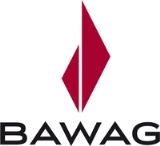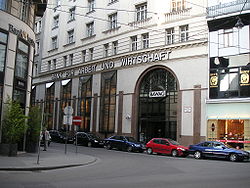
BAWAG
Encyclopedia

Austria
Austria , officially the Republic of Austria , is a landlocked country of roughly 8.4 million people in Central Europe. It is bordered by the Czech Republic and Germany to the north, Slovakia and Hungary to the east, Slovenia and Italy to the south, and Switzerland and Liechtenstein to the...
. On October 1, 2005, it merged with the separate Österreichische Postsparkasse
Österreichische Postsparkasse
Österreichische Postsparkasse is a postal savings bank in Austria. It was owned by the Austrian Mail and thus by the government. It merged in 1 October 2005, with the BAWAG to form BAWAG P.S.K..-During the Austro-Hungarian Empire:...
(P.S.K.) to form the "Bank für Arbeit und Wirtschaft und Österreichische Postsparkasse AG", shortened as BAWAG P.S.K.
BAWAG P.S.K.
BAWAG P.S.K. Bank für Arbeit und Wirtschaft und Österreichische Postsparkasse Aktiengesellschaft is the fourth largest bank in Austria...
.
History
BAWAG was founded in 1922 by the Austrian Chancellor Dr. Karl RennerKarl Renner
Karl Renner was an Austrian politician. He was born in Untertannowitz in the Austro-Hungarian Empire and died in Vienna...
, to extend favourable terms of credit to ordinary people, as the Arbeiterbank (Austrian Worker's Bank). Since the bank had close ties to the Social Democratic Party of Austria
Social Democratic Party of Austria
The Social Democratic Party of Austria is one of the oldest political parties in Austria. The SPÖ is one of the two major parties in Austria, and has ties to trade unions and the Austrian Chamber of Labour. The SPÖ is among the few mainstream European social-democratic parties that have preserved...
(SPÖ) and labour unions, it was forced to close in 1934 by the Austro-fascist
Austrofascism
Austrofascism is a term which is frequently used by historians to describe the authoritarian rule installed in Austria with the May Constitution of 1934, which ceased with the forcible incorporation of the newly-founded Federal State of Austria into Nazi Germany in 1938...
government of Chancellor Engelbert Dollfuß. It resumed its operations after the end of World War II
World War II
World War II, or the Second World War , was a global conflict lasting from 1939 to 1945, involving most of the world's nations—including all of the great powers—eventually forming two opposing military alliances: the Allies and the Axis...
in 1947.
In 1963, it took the name of Bank für Arbeit und Wirtschaft AG (BAWAG, translatable as "Bank for Labour and Business"). The bank continued to have close relations to social democratic party SPÖ and the unions. The Austrian Trade Union Federation
Austrian Trade Union Federation
-External links:*...
(ÖGB) retained 70% of the shares, the other 30% were held by the Konsum retail cooperative chain.
Starting in the 1970s, the bank actively used its finances to sponsor the promotion of Austrian contemporary art and culture. The BAWAG Foundation was established in 1974 with the goal of making art as accessible as possible to all people.
In 1979, parliament
National Council of Austria
The National Council is one of the two houses of the Austrian parliament. According to the constitution, the National Council and the complementary Federal Council are peers...
amended the Austrian Banking Act (Kreditwesengesetz or KWG), which now allowed the operation of branch
Branch
A branch or tree branch is a woody structural member connected to but not part of the central trunk of a tree...
offices. The BAWAG experienced rapid expansion throughout Austria, from an existing network of 26 offices to 120 by 1982.
The shareholder Konsum went bankrupt in 1995, which sent shockwaves through the political landscape in Austria, especially for the social democrats. The Bayerische Landesbank bought the shares and increased them to 46%.
In 2000, BAWAG successfully took over a majority of shares of the Österreichische Postsparkasse (P.S.K.) bank and bought 74.82% of the shares from the government. In November 2003, the remaining 25.18% were bought up as well. The merger, which was not finalised until 2005, created the country's third-largest bank group with a balance sheet total of nearly 45 billion euro
Euro
The euro is the official currency of the eurozone: 17 of the 27 member states of the European Union. It is also the currency used by the Institutions of the European Union. The eurozone consists of Austria, Belgium, Cyprus, Estonia, Finland, France, Germany, Greece, Ireland, Italy, Luxembourg,...
s, 5000 employees, some 2000 outlet
Outlet
Outlet may mean:* An electrical outlet* An outlet store or outlet mall* The pelvic outlet* A type of instance variable used for graphical user interface programming in the OpenStep / Cocoa environment* Outlet, Ontario, a community in Canada...
s and over one million private customers (2000). The new BAWAG/P.S.K. Group now had the largest centrally managed sales network in Austria.
With the combined assets, the new group BAWAG/P.S.K. experienced further growth. The piano manufacturer Bösendorfer
Bösendorfer
Bösendorfer is an Austrian piano manufacturer, and a wholly owned subsidiary of Yamaha. The brand is known for producing pianos with a uniquely rich, singing, and sustaining tone...
was bought from the American company Kimball International
Kimball International
Kimball International is a manufacturer of furniture and electronic assemblies, serving customers around the world. Kimball International consists of two groups: the Furniture Segment and the Contract Electronics Segment. It is the successor to W.W...
in 2001. Since the fall of the Iron Curtain
Iron Curtain
The concept of the Iron Curtain symbolized the ideological fighting and physical boundary dividing Europe into two separate areas from the end of World War II in 1945 until the end of the Cold War in 1989...
and the prospect of an accession of Central- and East Europe
Europe
Europe is, by convention, one of the world's seven continents. Comprising the westernmost peninsula of Eurasia, Europe is generally 'divided' from Asia to its east by the watershed divides of the Ural and Caucasus Mountains, the Ural River, the Caspian and Black Seas, and the waterways connecting...
an countries to the EU, new market opportunities open up. In 2002, the Slovakia
Slovakia
The Slovak Republic is a landlocked state in Central Europe. It has a population of over five million and an area of about . Slovakia is bordered by the Czech Republic and Austria to the west, Poland to the north, Ukraine to the east and Hungary to the south...
n bank Istrobanka
Istrobanka
Istrobanka was a universal commercial bank based in Slovakia established in September 1992.-History:Istrobanka's founding shareholder was Slovenská Poisťovňa . In 1993 the city of Bratislava, the capital city of Slovakia, became another shareholder...
is bought, a year later the Czech
Czech Republic
The Czech Republic is a landlocked country in Central Europe. The country is bordered by Poland to the northeast, Slovakia to the east, Austria to the south, and Germany to the west and northwest....
bank Interbanka. Both equities are owned 100% by the BAWAG. The new partners opened up opportunities to expand in retail banking
Retail banking
Retail banking is banking in which banking institutions execute transactions directly with consumers, rather than corporations or other banks. Services offered include: savings and transactional accounts, mortgages, personal loans, debit cards, credit cards, and so forth.-Types of...
and open new branches throughout Europe. In 2004, BAWAG acquired 100% of the shares of Dresdner Bank CZ
Dresdner Bank
Dresdner Bank AG was one of Germany's largest banking corporations and was based in Frankfurt. It was acquired by competitor Commerzbank in December 2009.- 19th century :...
, integrating it into the Interbanka, now renamed as BAWAG Bank CZ.
The Bayerische Landesbank sold its 46% share in 2004 to the other shareholder, the Austrian Trade Union Federation (ÖGB). With that deal, the ÖGB became sole owner of the BAWAG. Since the Refco
Refco
Refco was a New York-based financial services company, primarily known as a broker of commodities and futures contracts. It was founded in 1969 as "Ray E. Friedman and Co." Prior to its collapse in October, 2005, the firm had over $4 billion in approximately 200,000 customer accounts, and it was...
scandal in October 2005, which involved bad loans in the sum of 425 million euros, the bank almost defaulted on its obligations and had to be bailed out by the conservative government of Wolfgang Schüssel
Wolfgang Schüssel
Wolfgang Schüssel is an Austrian People's Party politician. He was Chancellor of Austria for two consecutive terms from February 2000 to January 2007...
. This has cast doubts about the future of links between the socialist-led unions and the bank.
The losses came from a series of failed bets using risky derivative investments held in off-balance-sheet vehicles. Though the bets go back as far as 1998, they surfaced only in 2006 during U.S. the investigations into the bankruptcy of Refco. Also Bawag lent Phillip Bennett, the former chief executive of Refco, hundreds of millions of dollars just before the brokerage filed for bankruptcy protection in October 2005.
As a result of the losses and subsequent investigations, criminal charges were filed against a number of BAWAG executives. Several people were found guilty and convicted. Helmut Elsner, former chief executive of Bawag, was found guilty of breach of trust, fraud and false accounting and was sentenced to nine and a half years in prison. The judge also ordered him to repay Bawag €6.8 million in pension benefits.
The defendants also included the Bawag executive Johann Zwettler and the investment banker Wolfgang Flöttl, who was based in the United States. Zwettler was given a five-year sentence. Flöttl was sentenced to 10 months. Six others were given various sentences.
In December 2006, US-based Cerberus Capital Management
Cerberus Capital Management
Cerberus Capital Management, L.P. is one of the largest private equity investment firms in the United States. The firm is based in New York City, and run by -year-old financier Steve Feinberg. Former U.S...
bought the bank for €3.2 billion.
External links
- BAWAG Homepage
- AEIOU | Bank für Arbeit und Wirtschaft AG, BAWAG
- Bawag Scrutiny Mounts, Putting CEO to the Test, October 21, 2005, Wall Street Journal

